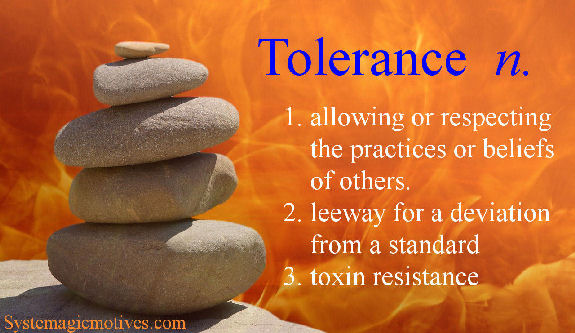Tolerance is one of the 'Fruits of the Spirit' and The Fruits of the Spirit are the personal application of The Universal Laws.

Tolerance n.
1. Allowing or respecting the practices or beliefs of others.
2. Leeway for a deviation from a standard.
3. Toxin resistance
Tolerance is the quiet engine of a diverse and functioning society, the capacity to accept and coexist with beliefs, practices, or identities that differ from our own. It is not about agreement or approval, but about patience and forbearance, a recognition of the inherent dignity in every individual. In a world teeming with varied perspectives, tolerance acts as the essential lubricant that prevents the friction of difference from erupting into the fire of conflict. It is the conscious choice to extend grace and understanding, allowing for a vibrant social tapestry where multiple threads can exist side-by-side without tearing the whole cloth apart. Without this fundamental principle, societies risk becoming monolithic and brittle, fracturing under the weight of dogmatism and prejudice.
Yet, the concept of tolerance is more nuanced than simple endurance. It can be mistaken for indifference, a passive act of "putting up with" something rather than engaging with it. The true challenge lies in its boundaries—a dilemma often called the paradox of tolerance: should a society tolerate the intolerant, those who would seek to destroy the very tolerance that allows them to exist? Perhaps the highest form of tolerance is not passive acceptance but active curiosity, a genuine desire to understand the "other" not just to coexist, but to learn and grow from the interaction. In this light, tolerance becomes the fertile ground from which respect, empathy, and a richer, more resilient community can ultimately flourish.
Factoid
In 313 AD, the Roman Empire took a groundbreaking step with the Edict of Milan. For the first time, an empire-wide policy officially granted religious tolerance, not just ending the persecution of Christians but proclaiming the right for all citizens to "worship whatever divinity he pleases." This was a powerful, state-sanctioned declaration of coexistence, laying an early foundation for the modern principle of religious freedom.
You just have to love them
the way that they are.